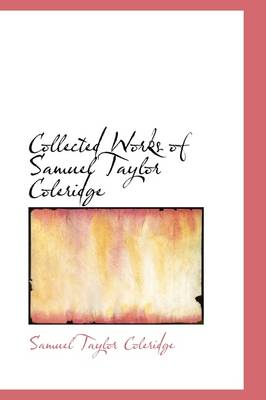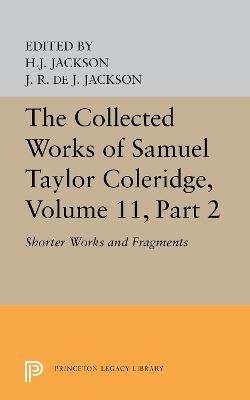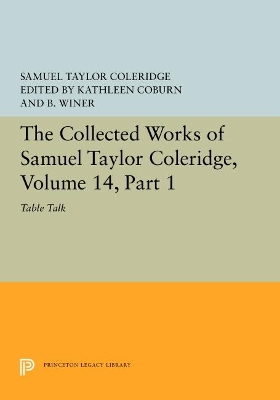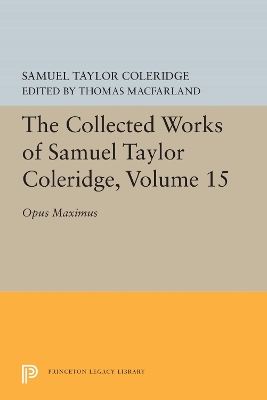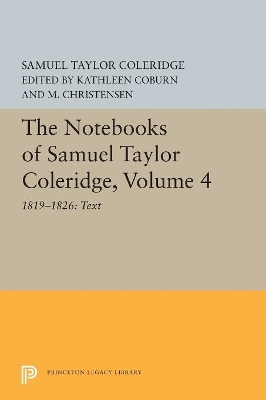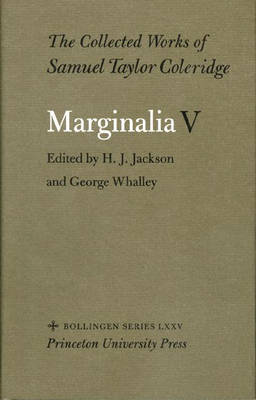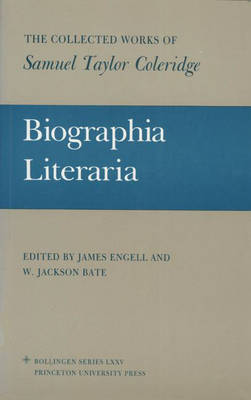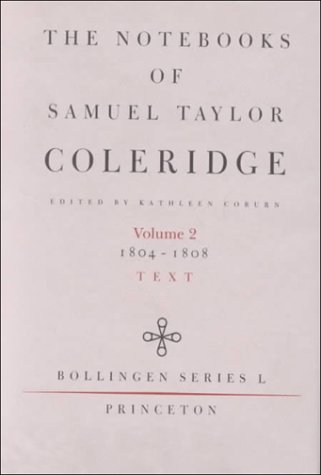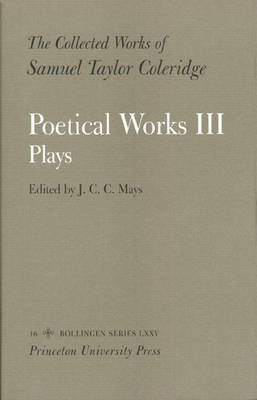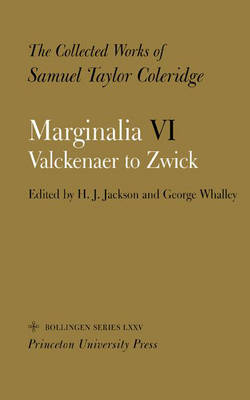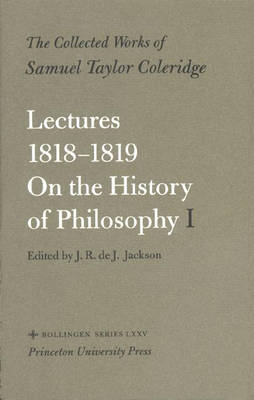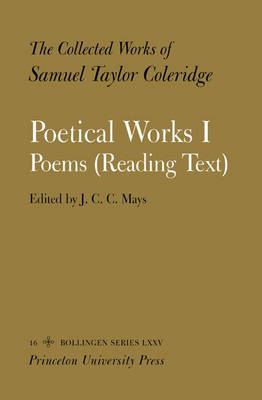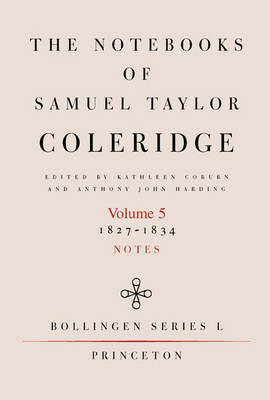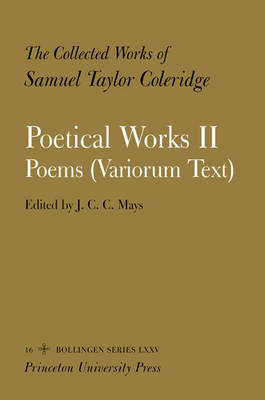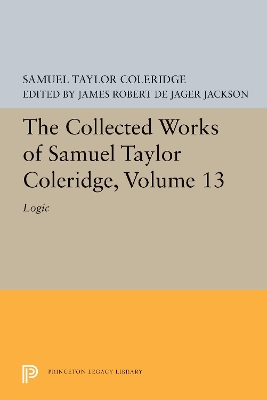Bollingen Series (General)
1 primary work • 17 total works
Book 75
The Collected Works of Samuel Taylor Coleridge, Volume 11
by Samuel Taylor Coleridge
Volume 2 of 2. Coleridge's Shorter Works and Fragments brings together a number of substantial essays that were not long enough to require volumes to themselves, among them his "Theory of Life," "Essays on the Principles of Genial Criticism," "Treatise on Method," "Confessions of an Inquiring Spirit," "On the Passions," and "On the Prometheus of Aeschylus." To these are added more than four hundred other pieces, some of them fragementary, many of them previously unpublished, ranging in date from school essays of the early 1790s to a discussion of the bullion controversy in 1834. As might be expected, the subject matter includes literature and language, theology, philosophy, politics, and science, but in many less predicatble topics (such as child labor laws, marriage, suicide, church history, the abolition of slavery, the state of the colonies) also appear. By gathering this material and presenting it in chronological order, Shorter Works and Fragments reveals the development and major characteristics of Coleridge's seemingly inexhaustible variety.
H.J. Jackson and J.R. de J. Jackson, Professors of English at the University of Toronto, are the editors of Coleridge's Marginalia and Logic, respectively, in the Collected Works of Samuel Taylor Coleridge.
Bollingen Series LXXV
Originally published in 1995.
The Princeton Legacy Library uses the latest print-on-demand technology to again make available previously out-of-print books from the distinguished backlist of Princeton University Press. These editions preserve the original texts of these important books while presenting them in durable paperback and hardcover editions. The goal of the Princeton Legacy Library is to vastly increase access to the rich scholarly heritage found in the thousands of books published by Princeton University Press since its founding in 1905.
The Collected Works of Samuel Taylor Coleridge, Volume 14
by Samuel Taylor Coleridge
Volume 1 of 2. Coleridge's nephew, son-in-law, and first editor, Henry Nelson Coleridge, began at the end of 1822 a record of Coleridge's remarks as a way of preparing an anthology of the interests and thought of the great poet and critic. His manuscripts, gathered to form the major text of his new edition, include passages on relatives, friends, and various censorable topics omitted from the Table Talk of 1835 and unpublished until now. These two volumes also contain talk recorded by other listeners from 1798 until Coleridge's death in 1834. Some of these records have not been previously published; some are published from manuscripts that differ from versions previously known. Also included are previously unpublished remarks by Wordsworth. Along with a bibliography of earlier editions of Table Talk and other useful appendixes, Carl Woodring's edition reprints the second edition (1836), which differs from the manuscripts more extensively than the edition of 1835.
THis is the first fully annotated edition of a work that long remained more popular in the United Kingdom than any of the works in prose published by Coleridge himself. The two volumes make a convenient encyclopedia of his ideas and interests.
Carl Woodring is George Edward Woodberry Professor of Literature Emeritus at Columbia University.
Originally published in 1990.
The Princeton Legacy Library uses the latest print-on-demand technology to again make available previously out-of-print books from the distinguished backlist of Princeton University Press. These editions preserve the original texts of these important books while presenting them in durable paperback and hardcover editions. The goal of the Princeton Legacy Library is to vastly increase access to the rich scholarly heritage found in the thousands of books published by Princeton University Press since its founding in 1905.
The Collected Works of Samuel Taylor Coleridge, Volume 15
by Samuel Taylor Coleridge
The Opus Maximum gathers the last major body of unpublished prose writings by Samuel Taylor Coleridge. Consisting primarily of fragments dictated to Joseph Henry Green, probably between 1819 and 1823, these writings represent all that exists of what Coleridge considered to be "the principal Labour" and "the great Object" of his life, which he called variously the Logosophia and Magnum Opus.
Dedicated to "the reconcilement of the moral faith with the Reason," Coleridge's envisioned Magnum Opus was supposed to "reduce all knowledges into harmony." While such a synthesis finally eluded him, and the Magnum Opus remained unfinished, the surviving fragments nonetheless bear powerful witness to Coleridge's engagement with theology, moral philosophy, natural philosophy, and logic, among other disciplines. Among the subjects that will particularly interest readers are Coleridge's criticisms of Epicureanism, pantheism, and German Naturphilosophie; his attempt to ground reason in faith; and his reflections on personhood (especially in the relationship between mother and child), on will, on language, and on the Logos.
Previously unknown to all but a handful of scholars, the manuscripts presented here provide valuable insight into a crucial period of Coleridge's intellectual development, as he became increasingly dissatisfied with Naturphilosophie and struggled to affirm Trinitarian Christianity on a rational basis. With this volume, The Collected Works of Samuel Taylor Coleridge, begun forty years ago under the sponsorship of the Bollingen Foundation and the editorship of the late Kathleen Coburn, is now complete.
The Notebooks of Samuel Taylor Coleridge, Volume 4
by Samuel Taylor Coleridge
During his adult life until his death in 1834, Coleridge made entries in more than sixty notebooks. Neither commonplace books nor diaries, but something of both, they contain notes on literary, theological, philosophical, scientific, social, and psychological matters, plans for and fragments of works, and many other items of great interest. This fourth double volume of the Notebooks covers the years 1819 through 1826. The range of Coleridge's reading, his endless questioning, and his recondite sources continue to fascinate the readers. Included here are drafts and full versions of the later poems. Many passages reflect the technological interests that led to Coleridge's writing of Aids of Reflection, later to become an important source for the Transcendentalists.
Another development in this volume is the startling expansion of Coleridge's interest in "the theory of life" and in chemistry--the laboratory chemistry of the Royal Institution of Great Britain and the theoretical chemistry of German transcendentalists such as Okea, Steffens, and Oersted. Also contained in this volume is an important section on the meaning of marriage.
Kathleen Coburn is Professor Emeritus at Victoria College of the University of Toronto. Merton Christensen was Professor of English at the University of Delaware.
Bollingen Series L:4.
Originally published in 1990.
The Princeton Legacy Library uses the latest print-on-demand technology to again make available previously out-of-print books from the distinguished backlist of Princeton University Press. These editions preserve the original texts of these important books while presenting them in durable paperback and hardcover editions. The goal of the Princeton Legacy Library is to vastly increase access to the rich scholarly heritage found in the thousands of books published by Princeton University Press since its founding in 1905.
The Collected Works of Samuel Taylor Coleridge, Vol. 12, Part 5
by Samuel Taylor Coleridge
Tennemann; and also on the writings of St. Teresa of Avila. The subjects addressed range from literature and philosophy through religion, politics, history, and biography, to travel-writing and science.
The Collected Works of Samuel Taylor Coleridge, Volume 7
by Samuel Taylor Coleridge
Biographia Literaria has emerged over the last century as a supreme work of literary criticism and one of the classics of English literature. Into this volume poured 20 years of speculation about the criticism and uses of poetry and about the psychology of art. Following the text of the 1817 edition, the editors offer the first completely annotated edition of the highly allusive work.
The Notebooks of Samuel Taylor Coleridge, Volume 2
by Samuel Taylor Coleridge
The Notebooks of Samuel Taylor Coleridge, Volume 3
by Samuel Taylor Coleridge
This third volume covers the period from Coleridge's first lectures on poetry, at the Royal Institution, and the inception of The Friend, to his last lecture in 1819. It is, therefore, the period of his various courses of lectures on Shakespeare and other literary subjects, and on philosophy, of the Biographia Literaria, and the Lay Sermons. During this time, Coleridge's close friendship with Wordsworth deteriorated, ending in an estranging quarrel. His drug addiction was deepest during these years of his life, until he finally found haven in Dr. Gillman's house at Highgate.
The Notebooks of Samuel Taylor Coleridge, Volume 1
by Samuel Taylor Coleridge
Some 1,800 entries, representing the "annus mirabilis" of 1797-1798, descriptions of the Lake Country, and notes on Coleridge's travels in Germany.
The Collected Works of Samuel Taylor Coleridge, Vol. 16, Part 3
by Samuel Taylor Coleridge
As in the first and second parts, all known manuscript, printed, and annotated versions have been collated to produce reading texts, and much new information, historical as well as textual, is presented in the commentary. The index covers proper names and prominent themes and features of all three parts. The presentation of four plays is of particular interest. Coleridge's translations of Schiller's Piccolomini and Death of Wallenstein are accompanied by facing texts of the German originals (the first reconstructed by Joyce Crick, the second from a manuscript authorized by Schiller himself) so that, for the first time, Coleridge's practice as translator can be properly assessed. Secondly, Remorse is presented in stage and printed-text versions; the former demonstrates how Coleridge's play evolved in the course of the rehearsal process and during performance, how it was received and how it enjoyed an afterlife in contemporary theatres, whereas the printed-text version developed quite differently. This authoritative volume offers a revealing and comprehensive portrait of Coleridge's work in the dramatic form.
The Collected Works of Samuel Taylor Coleridge, Vol. 12, Part 6
by Samuel Taylor Coleridge and George Whalley
A key-word index to the six volumes of Marginalia, provided here, will give readers ready access to Coleridge's ideas on subjects ranging from literature and philosophy through religion, politics, history, biography, and science.
The Collected Works of Samuel Taylor Coleridge, Volume 8
by Samuel Taylor Coleridge
The edition presents a fully annotated and indexed text of the lecture series, and it provides in addition the complete texts of the shorthand reports and of Coleridge's own notes (which were omitted from the Coleridge Notebooks), along with newspaper and manuscript reports by people who attended the lectures. The volume includes an appendix by Owen Barfield, which is drawn from his incomplete manuscript edition of the lectures.
The Collected Works of Samuel Taylor Coleridge, Vol. 16, Part 1
by Samuel Taylor Coleridge
Each poem is accompanied by a headnote and commentary that together provide its historical-biographical context and offer key textual variants. The book opens with an introduction and chronological tables. The three appendixes position individual poems in the contexts in which they appeared during Coleridge's lifetime. Illustrations such as contemporary scenes and portraits bring this rich collection, like the companion volumes, all the more to life.
The Notebooks of Samuel Taylor Coleridge, Volume 5
by Samuel Taylor Coleridge
He planned a major work on Logic (still unpublished at his death), and an outline of Christian doctrine, also unfinished, though his work toward this project contributed to On the Constitution of the Church and State (1830) and the revised Aids to Reflection (1831). The reader of these notebooks has the opportunity to see what one of the most admired minds of the English-speaking world thought on several issues--such as race and empire, science and medicine, democracy (particularly in reaction to the Reform Bills introduced in 1831 and 1832), and the authority of the Bible--when he wrote without fear of public disapprobation or controversy.
The Collected Works of Samuel Taylor Coleridge, Vol. 16, Part 2
by Samuel Taylor Coleridge
All told, the Collected Coleridge variorum sequence collates over a third more additional texts--in more detailed and accurate form--than those found in the previous standard edition, by E.H. Coleridge. The presentation method in this second part will interest editorial theorists as well as those interested primarily in Coleridge and/or the making of poetry. The unusually detailed textual information also reveals changes in such areas as linguistic and grammatical usage, patterns of transcription and circulation among anthologists, and contemporary publishers' house styles.
The Collected Works of Samuel Taylor Coleridge, Volume 13
by Samuel Taylor Coleridge
The manuscript of Coleridge's Logic is published here in its entirety for the first time, along with the texts of manuscripts that are directly related to it.
Coleridge's plans to write about logic go back at least as far as 1803, but it was not until the 1820s that he undertook to write a book that would be of practical use to young men about to enter "the bar, the pulpit, and the senate." By that time the philosophy course he taught to classes of such young men had given them access to his thoughts, and he in turn benefited from their interest and enthusiasm. Coleridge wished to encourage his readers to think for themselves in a manner that was consistent and self-aware. He hoped to provide them with a system of logic "applied to the purposes of real life."
His Logic differs from earlier English models in its emphasis on the psychology of thought and in its sceptical treatment fo the figures of the syllogism. Here the influence of Kant's Critique of Pure Reason predominates. The Logic is also concerned with the psychology of language--indeed Coleridge thought of calling the book "The Elements of Discourse"--and with the philosophical and theological implications of different semantic theories. Here he was sustained by a vigorous English tradition and aided by his own subtle experience of the relationship between thoughts and words.
The Logic is an introduction to thinking about thought. It touches on a variety of topics--education, the origin of language, the importance of defining terms, subjective and objective truth, the meaning of abstraction, understadning and reason, conception and perception, self-consciousness, intuition, space and time, cause and effect, mathematical evidence, and the mind's emancipation from the senses--and behind these characteristic concerns Coleridge's more comprehensive views may be freshly glimpsed.
J.R. de J. Jackson is Professor of English at the University of Toronto. He is the author of Method and Imagination in Coleridge's Criticism and the editor of Coleridge: The Critical Heritage (both published by Routledge & Kegan Paul).
Bollingen Series LXXV
Originally published in 1981.
The Princeton Legacy Library uses the latest print-on-demand technology to again make available previously out-of-print books from the distinguished backlist of Princeton University Press. These editions preserve the original texts of these important books while presenting them in durable paperback and hardcover editions. The goal of the Princeton Legacy Library is to vastly increase access to the rich scholarly heritage found in the thousands of books published by Princeton University Press since its founding in 1905.
